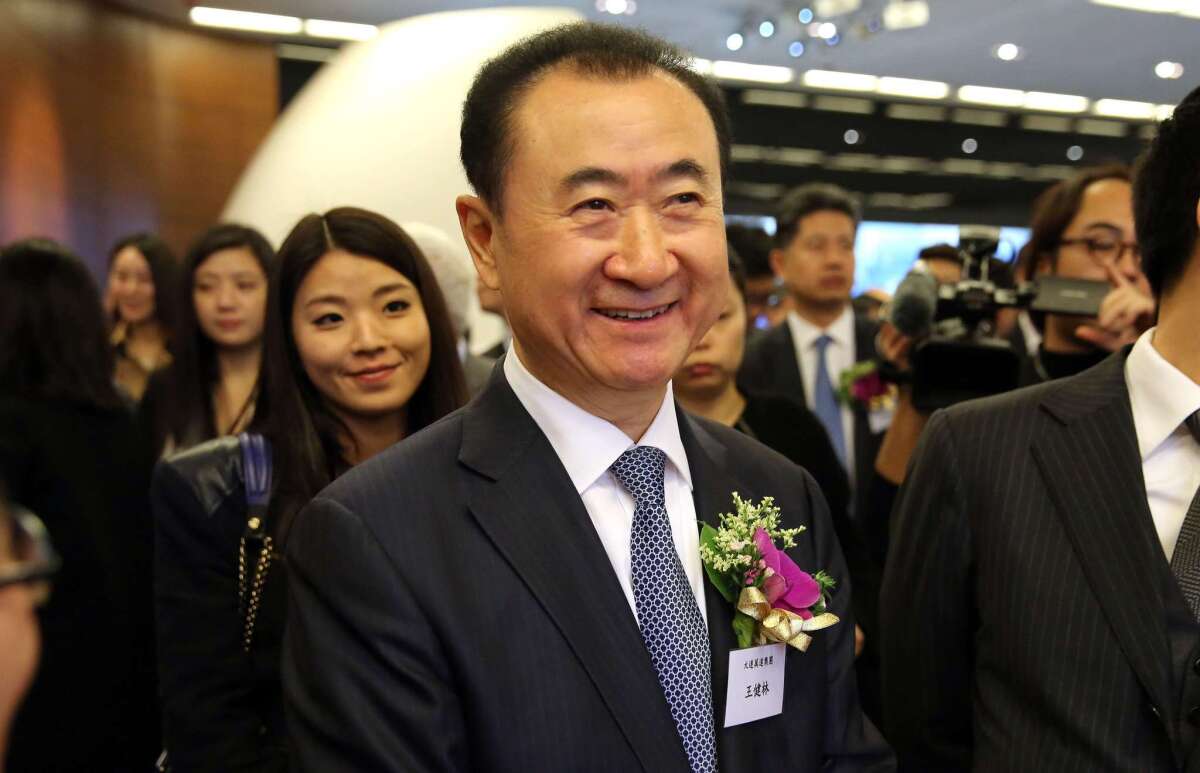Why China market turmoil won’t slow Hollywood dealings

Wang Jianlin, chief executive of Dalian Wanda Commercial Properties, arrives before the company’s IPO at the Hong Kong Stock Exchange on Dec. 23, 2014. Wanda is the owner of China’s largest theater chain.
- Share via
China’s stock markets took another beating Thursday, triggering a global sell-off. But the turmoil is not expected to slow the rapid rise of the Chinese movie business or deal-making with Hollywood players.
Shares on the Shanghai Composite index dropped a total of 7%, which, under China’s new “circuit breaker” system, brought an end to the trading day after just 14 minutes of active dealing. It was the second time in four days that China’s market shuttered early because of price drops.
U.S. markets again took the news hard. The Dow Jones industrial average, the Standard & Poor’s 500 and the Nasdaq were all down more than 2% in midday trading on Wall Street on concerns about China’s economy.
See more of our top stories on Facebook >>
But despite the roiling markets and the worries over China’s economic slowdown, business executives and analysts expect Hollywood dealings to continue apace as China comes off another year of soaring box office returns.
Even as China faces headwinds overall, the cinema industry continues to boom. China, the world’s second-largest film market, generated $6.8 billion in ticket sales in 2015, up nearly 50% from the previous year, with much of the total coming from homegrown hits.
Major Chinese companies have invested heavily in building theaters in their home country, building a national entertainment culture and doing deals with American firms, and that’s not likely to stop now. Despite the market declines, the entertainment business in China remains fundamentally strong, analysts said.
Stanley Rosen, a political science professor at USC and an expert on China, said billionaire executives such as Wanda’s Wang Jianlin and Alibaba Group’s Jack Ma still have plenty of incentive to grow their businesses by investing in content even if shares of their companies get hammered at home.
“There are positive and negative aspects, it seems to me, in terms of future deal-making, but the biggest companies ... should still be able to invest successfully,” Rosen said.
Lindsay Conner, an entertainment industry attorney and partner at Manatt, Phelps & Phillips, also does not think the market turmoil will dampen the flowering China-Hollywood relationship.
“Based on what we’ve seen so far, I don’t believe it will change the pace of deal-making between Hollywood and China,” Conner said. “Chinese companies see the value of Hollywood as a center of the global industry, and Hollywood companies see the value of China as a market and a financing partner. Stock markets will go up and down, but the fundamentals of that relationship won’t change.”
Conner noted that most of the deals between Hollywood companies and Chinese investors are cash-based, making China’s stock market less of a factor in decisions about whether to buy or invest in Hollywood. This is especially true of the biggest potential players in the media space: Alibaba, Tencent and Wanda.
In fact, Wanda, the media conglomerate and owner of China’s largest theater chain, is expected to finalize a deal to buy Burbank-based Legendary Entertainment as early as next week, according to people familiar with the transaction. The deal values Legendary, producer of “The Dark Knight” and “Hangover” movies, at $4 billion.
Additionally, China’s cinema business continues to grow inexorably. A rising middle class has spawned a surge in construction of movie theaters in small cities around the country. The country added 9,000 screens in 2015 and the pace is not expected to slow down this year.
Imax Corp. , the Canadian big screen theater chain with a large presence in China, has felt the sting of China’s market turmoil. The company launched a publicly-traded Chinese subsidiary on the Hong Kong stock exchange last year. Not surprisingly, Imax China Holding’s stock has been hammered by the market downturn in recent days. The shares dropped about 14% on Thursday.
But Imax Corp. Chief Executive Richard Gelfond said the market turmoil will not hurt Imax’s Chinese business, which has been growing rapidly in response to the surge in cinema construction across the country and the popularity of big Hollywood movies. Imax is partnered with Wanda Cinema, and has seen its theater revenues in China grow at a 35% compound annual rate over the last five years.
While Chinese consumers may cut back on purchases of some higher ticket items such as cars, they aren’t likely to curtail the purchases of movie tickets, which are still relatively affordable in China, Gelfond said.
SIGN UP for the free Classic Hollywood newsletter >>
What’s more, he said, the cinema industry enjoys the strong backing of the Chinese government, which views film as an important growth engine.
“Hollywood and entertainment has everything to do with the way they are going,” Gelfond said. “China’s economy is in transition from one that is export-driven to one that is more consumer-driven. So it makes sense that the way out of this is to spend more money on entertainment.”
Los Angeles Times staff writer Richard Verrier contributed to this report.
Follow Ryan Faughnder on Twitter for more entertainment business coverage: @rfaughnder
MORE ON CHINA
China’s economy: Seven predictions for 2016
U.S. media stocks dip following China market rout
After a year of disruption, China looks to 2016 with cautious optimism
More to Read
From the Oscars to the Emmys.
Get the Envelope newsletter for exclusive awards season coverage, behind-the-scenes stories from the Envelope podcast and columnist Glenn Whipp’s must-read analysis.
You may occasionally receive promotional content from the Los Angeles Times.








